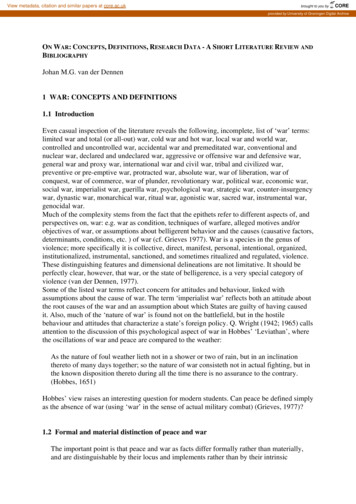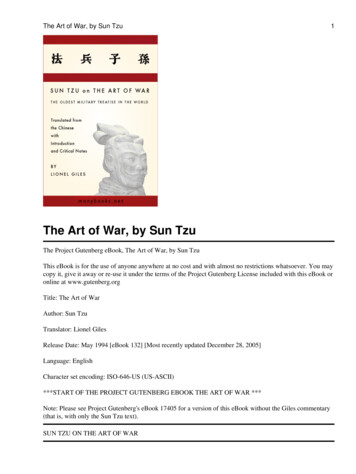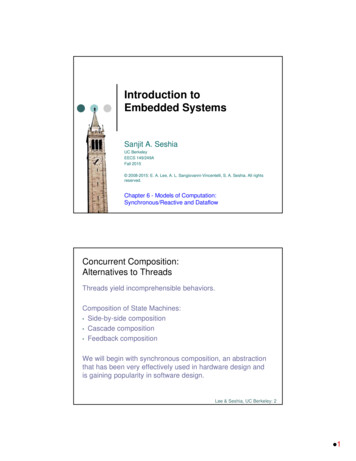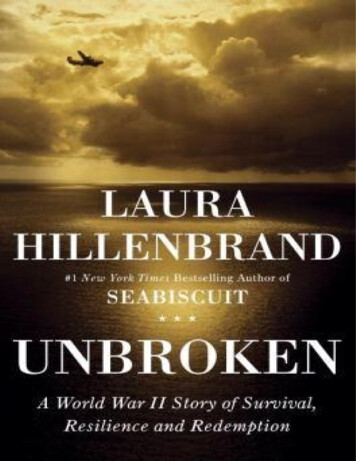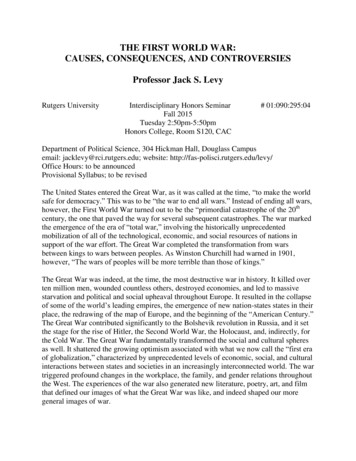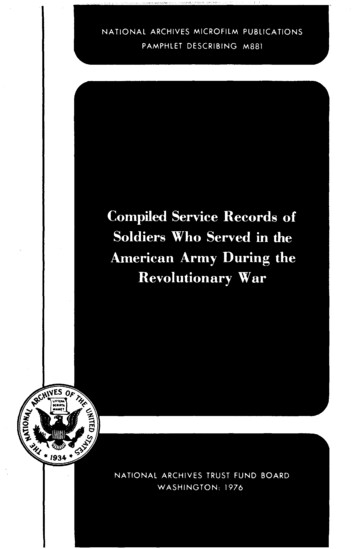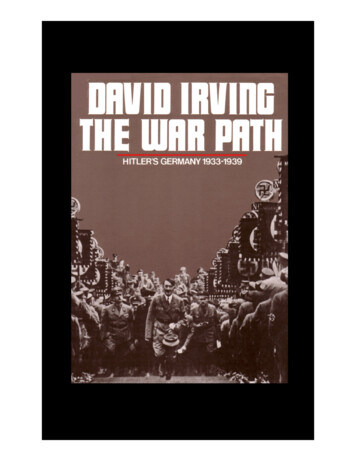
Transcription
David IrvingTHE WAR PATHHITLER’S GERMANY – FFOCAL POINT
Copyright by David IrvingElectronic version copyright by Parforce UK Ltd.All rights reserved. No reproduction, copy or transmission of this publicationmay be made without written permission. Copies may be downloaded fromour website for research purposes only. No part of this publication may becommercially reproduced, copied, or transmitted without written permissionin accordance with the provisions of the Copyright Act (as amended). Anyperson who does any unauthorised act in relation to this publication may beliable to criminal prosecution and civil claims for damages.
David Irving is the son of a Royal Navycommander. Imperfectly educated atLondon's Imperial College of Science &Technology and at University College, hesubsequently spent a year in Germanyworking in a steel mill and perfecting hisfluency in the language. In he published The Destruction of Dresden. This became a bestsellerin many countries. Among his thirty books, the best-knowninclude Hitler's War; The Trail of the Fox: The Life of FieldMarshal Rommel; Accident: The Death of General Sikorski;The Rise and Fall of the Luftwaffe; and Nuremberg: The LastBattle. The second volume of his Churchill's War appearedin ; a third volume is in preparation. Many of his worksare available as free downloads at www.fpp.co.uk/books.
ContentsAuthor’s Foreword vPROLOGUE —PART I :The Nugget Approach to Absolute PowerFirst Lady Dictator by Consent Triumph of the Will “One Day, the World” Goddess of Fortune “Green” The Other Side of Hitler Whetting the Blade Munich One Step along a Long Path PART II :Toward the Promised LandIn Hitler’s Chancellery Fifty Extreme Unction The Major Solution Pact with the Devil EPILOGUE —His First Silesian War Abbreviations Used in Source Notes Source Notes Index
Author’s ForewordThis book narrates one man’s path to war – Adolf Hitler’s.The narrative ends at the precise moment when the companion volume, Hitler’s War,* begins: the evening of September , as he leaves his Berlin Chancellery for the Polish warfront. Like that volume, The War Path also tries todescribe events from behind the Führer’s desk, and to seeand understand each episode through his eyes. The technique necessarily narrows the viewpoint, but it does help toexplain otherwise inexplicable decisions. Nobody that Iknow of has attempted this before, but to me it seemedworth all the effort: after all, Hitler’s war sucked in onecountry after another, left forty million dead and caused allEurope and half of Asia to be wasted by fire and explosives;it destroyed Hitler’s Third Reich, bankrupted Britain andlost her her empire, and brought lasting disorder to theworld’s affairs; it saw the entrenchment of communism inone continent, and its emergence in another.I have approached the main narrative in logical chronological sequence. How Hitler actually came to power in is merely outlined here – the topic has been proficiently covered by others, particularly Karl Dietrich Bracherand Wolfgang Sauer. The focus of my research fell on hisyears of power, and from February , when Hitler tellshis generals in secret of his ambition to launch a war of imperial conquest in the east as soon as Germany is able, thedetail thickens and the colour becomes enriched.Fieldwork can be expensive and unrewarding, thoughit always carries with it the exhilarating hope of sudden* Hitler’s War, published in by The Viking Press (New York), Hodder & Stoughton (London) and in other countries.
revelation. It is an acquired taste. It means bargaining foryears with governments like that of East Germany for permission to search for buried documents; it means longseparations from wife and family, sleeping on overnighttrains, and haggling with retired generals and politicians ortheir widows, to part them temporarily from their carefullyguarded caches of diaries or letters. It means leafingthrough hundreds of thousands of pages of filthy paper inremote and chilly archives, intuitively registering egregiousfacts in the hope that some of them may, perhaps, clickwith facts found years later in another file five thousandmiles away.In writing this volume I have obtained a number of little-known but authentic diaries of people in Hitler’s entourage, including an unpublished segment of Alfred Jodl’s diary; the official diary kept for OKW chief Wilhelm Keitel byhis adjutant Wolf Eberhard, and Eberhard’s own diary, – ; the diary of Nikolaus von Vormann, army liaisonofficer to Hitler during August and September ; anddiaries kept by Martin Bormann and by Hitler’s personaladjutant, Max Wünsche, relating to the Führer’s movements. In addition I have used the unpublished diaries ofFedor von Bock, Erhard Milch, Wilhelm Leeb, Ernst vonWeizsäcker, Erwin Lahousen and Eduard Wagner. Many ofthese men wrote revealing private letters, too – Frau Elisabeth Wagner gave me some two thousand pages of EduardWagner’s letters, significant sections of which turned out tohave been omitted from their published version. ChristaSchroeder, Hitler’s secretary, also made available to meimportant contemporary papers, while Julius Schaub’sfamily let me copy all his manuscripts and writings abouthis twenty years as Hitler’s senior aide. I believe I am thefirst biographer to have used the papers of Herbert Backe, a
state secretary in the Nazi government; I am certainly thefirst to have explored the diaries, notebooks and papers ofFritz Todt, builder of Hitler’s autobahns and his first munitions minister, through the kindness of his daughter, IlsebillTodt.Some of the most revealing documents used exclusively here in The War Path are the private manuscriptswritten by General von Fritsch, which I obtained from a Soviet source; they relate the entire Blomberg–Fritsch crisis of through Fritsch’s own eyes. No former Hitler employeewhom I approached declined to grant me interviews; fromthe various government archives I obtained detailed interrogation reports on many of them, too. All these records arenow part of the Irving Collection in the Institute of Contemporary History in Munich, available with some exceptions to other researchers. There, too, researchers will findthe line-by-line annotations originally prepared for thisbook (some , pages of source notes!); these were dispensed with in this volume for reasons of space, but where Ianticipate that the reader will definitely want to knowmore, I do point – at the back of the book, from page –to some of the more noteworthy sources that I have tapped.Second World War researchers will find that many of thespecial microfilms of materials that I prepared while researching this book are now available through E. P. Microforms Ltd., East Ardsley, Wakefield, Yorkshire, England.There have been sceptics who questioned whether theheavy reliance on – inevitably angled – private sources isany better as a method of investigating Hitler’s career thanthe more traditional quarries of information. My reply isthat it would, equally, be wrong to deny the value of suchprivate sources altogether.
I make no apology for having revised the existing picture of Adolf Hitler. The postwar world’s view of him hasbeen so conditioned by our own propaganda against himthat only the cartoon caricature of him prevails; hence anyaccount based on authentic records of the era is bound toenhance history’s view of him in some respects – althoughit will detract from it in many others. I have tried to accordhim the kind of hearing that he would have got in an English court of law – where the normal rules of evidence apply, but also where a measure of insight is appropriate.
PROLOGUEThe NuggetHow can we ever learn what Hitler’s real ambitions were?No doubt an unrefined black nugget of ambition didnestle deep within him, but it was well hidden beneath athousand shrouds, and repressed by his own personal fearsof baring his innermost intentions even to the most intimate of his friends.One of the men closest to him, who served him as airforce adjutant from to the very end, has emphasizedthat even when we read of some startling outburst by Hitlerto his henchmen, and we feel we are getting closer to thetruth, we must always ask ourselves: was that the real Hitler, or was it still just an image that he wished to impose onthat particular audience of the moment? Were those hisauthentic aims, or was he just seeking to jolt his complacent satraps out of a dangerous lethargy?So we must go prospecting deep down into the bedrock of his history before we can trace to its origins thatconsistent seam of secret, consuming ambition of whichthe last six years of his life were just the violent expression.Mein Kampf, written in prison in and afterward, certainly reveals some of these secrets, and in later years heregretted having published it for just that reason; becausethe Hitler of the Chancellery in Berlin was more circumspect than the Hitler of the barricades, and the Hitler in thefirst foothills of power was more subtle of tongue than the
demobilized foot-soldier and agitator of the beerhalls ofBavaria.Excellent sources survive, even before Mein Kampf.The confidential police reports on twenty of Hitler’s earlyspeeches, delivered in smoky, crowded halls in the revolutionary Soviet Munich of and , provide a series ofglimpses at the outer shell of his beliefs, which he was stilladapting to accommodate whichever views he found to bemost loudly acclaimed by the two or three thousand listeners he attracted on each occasion. Here Adolf Hitler, justturned thirty years of age, expressed no grand geopoliticalideas, no dreams of eastern empire: evidently these ambitions must have grown within him soon after. His agitationpivoted on the terms dictated to Berlin’s “craven and corrupt” representatives at Versailles; he tried to convince hisaudience that defeat in the World War had been inflictedon them not by their enemies abroad, but by the revolutionaries within – the Jew-ridden politicians in Berlin. This, , was the year in which the National Socialist GermanWorkers’ Party launched its programme, donned its swastika armbands and organized its own squads to keep order– the later Sturmabteilung (SA) brownshirt bullies.Stripped of their demagogic element, the speeches aresignificant only for Hitler’s ceaseless reiteration that aGermany disarmed was prey to the lawless demands of herpredatory neighbours. After the victory of , Germanyhad been a nation of purpose, order, incorruptibility andexactitude – mighty, magnificent and respected, healthywithin and powerful without, her engineers and merchantsgradually displacing the British from their accustomedplace astride the world markets by their diligence, uprightness and profundity. This, indicated Hitler, was the realreason why Britain had fought the war; this was the reason
for the Treaty of Versailles. It was the victory of naked forceover justice – the same lawless means that Britain had usedagainst China in the opium war of , and the means thathad gained for Britain practically one-fifth of the earth’ssurface. In these outpourings Hitler’s envy of Britain became plain – his envy of the national spirit, master-racequalities and genius whereby the British had won their colonial empire.Other themes emerged in these early, beerhallspeeches. He demanded that Germany become a nationwithout class differences, in which manual labourer andintellectual each respected the contribution of the other.On one occasion, in April , he even proclaimed, “Weneed a dictator who is a genius, if we are to arise again.”His sentiments were ultra-nationalist. The new Partyhad “German” in its title, he said, “because we want to beGerman, and we are going to make war on the PolishJewish vermin.” His targets were not modest even then: hewas going to establish a new German Reich, extending fromMemel in the east to Strasbourg in the west, and fromKönigsberg to Bratislava. In another secret speech, delivered to an audience in Salzburg – evidently on or August – Hitler roused his Austrian compatriots with the sametwo ideals: “Firstly, Deutschland über alles in der Welt. Andsecondly, our German domain extends as far as the Germantongue is spoken.”This Salzburg speech, of which only one faded, fragileand hitherto unpublished shorthand transcript has survived, comes closest to revealing his early mind and attitudes. He made the bursting of the “chains of Versailles”the prerequisite for any reforms in Germany – and foremostamong those reforms he called for the eradication of the“Jewish bacillus” from their midst:
This is the first demand we must raise and doraise: that our people be set free, that these chainsbe burst asunder, that Germany be once againcaptain of her soul and master of her destinies, together with all those who want to join Germany.(Applause).And the fulfilment of this first demand willthen open up the way for all the other reforms.And here is one thing that perhaps distinguishesus from you [Austrians] as far as our programme isconcerned, although it is very much in the spirit ofthings: our attitude to the Jewish problem.For us, this is not a problem you can turn ablind eye to – one to be solved by small concessions. For us, it is a problem of whether our nationcan ever recover its health, whether the Jewishspirit can ever really be eradicated. Don’t be misled into thinking you can fight a disease withoutkilling the carrier, without destroying the bacillus.Don’t think you can fight racial tuberculosis without taking care to rid the nation of the carrier ofthat racial tuberculosis. This Jewish contamination will not subside, this poisoning of the nationwill not end, until the carrier himself, the Jew, hasbeen banished from our midst. (Applause)Language like that went down well. Hitler had laced hisearlier speeches with more abstract topics like the relationship between national strength and international justice,but he soon found that was not the language the mobswanted to hear. In successive speeches in he called forthe hanging of war profiteers and racketeers; he identifiedthem as the Jews; and then he began to concentrate hisvenom on the Jews as a whole, on the Ostjuden from Russia, and on the “Polish-Jewish vermin” who had floodedinto Vienna and Germany.On August , the police reports show, Hitler forthe first time devoted his speech solely to the Jews. First he
developed abstruse racial theories, far above the head of hisbeer-swilling listeners. But then he accused the Jews of responsibility for the war, of having governed Germany criminally badly and of profiteering. Moreover, he warned, it wasthe “oriental wideboys” in the German press who wereeven now systematically undermining Germany’s nationalsoul – dividing and subverting her. Of friendly Vienna theyhad made a second Jerusalem; and while Austria’s soldiersreturned to slums, almost half a million Jews – mostly fromGalicia – had flooded in and were now living in palatialapartments.These slanderous claims aroused his unruly audiences.Hitler was encouraged to propose the solution. The NaziParty must open a crusade against the Jews. “We do notwant to whip up a pogrom atmosphere. But we must befired with a remorseless determination to grasp this evil atits roots and exterminate it, root and branch.” This wasgreeted by storms of applause; so was his recommendation:“All means are proper to that end – even if we have to agreeterms with the Devil!” A few weeks later he boasted, “Whenwe come to power, we will charge in like buffaloes.” And onanother occasion he repeated, “We cannot skirt round theJewish problem. It has got to be solved.”Between and his seizure of power in , the eventsneed only be sketched in. Adolf Hitler launched an abortiverevolution in Munich in November , was tried, imprisoned in Landsberg fortress and eventually released. Hepublished Mein Kampf and rebuilt the Party, riven in hisabsence by dissension, over the next years into a disciplined and authoritarian force with its own Party courts, itsbrownshirt SA guards and its black-uniformed “PretorianGuard,” the SS, until at the head of a swollen army of a mil-
lion Party members he arrived at the Chancellery in Berlinin January , after thirteen years of warfare against hisself-defined targets – Marxist class struggle, Jewish culturaland economic domination and the fetters of Versailles. Itwas no mean feat for an unknown, gas-blinded, pennilessacting-corporal to achieve by no other means than hispower of speech and a driving ambition to fulfil a stillconcealed and dark ambition.The private letters of Walther Hewel, a nineteen-yearold student imprisoned in Landsberg with him, showgraphically the extraordinary hold that Hitler already exerted on his followers – a hold that lasted until , whenthe writer committed suicide with Hitler. On November , first anniversary of the putsch, he wrote:At P.M. yesterday, to the strains of the Hohenfriedberg March played by the prison band, Hitler,Lieutenant-Colonel Kriebel, Dr. Weber and RudolfHess came over to us. – : P.M.: the historicalmoment when the trucks of “Storm Troop Hitler”went into action on the eighth. Then Hitler madea short speech which it is simply impossible toconvey in writing. It left us numb. In a few wordshe moved us so much that every one of these often rough and unruly men went back mutely andtamely to their cells. For half an hour none of uscould speak. – What would many men have givento hear this man this evening! As though surrounded by seven thousand people in a circus, soHitler stood in our midst in the little room. – Today, Sunday, he came over at P.M. and brieflysaid: “Young men, one year ago at this momentyour comrades were lying dead amongst you.”Then he thanked us for having been so loyal tohim, then and now, and gave us each his hand.And when Hitler takes your hand and looks intoyour eyes something like an electric shock strikes
through you, a pulse of power and energy andDeutschtum [Germandom] and everything that isstrong and beautiful in the world. When he haddone the round, he stepped shortly back: “Andnow – a Heil to our dead comrades. Heil!” The waythat man said those few words, it was all over forus. . . . Perhaps you can’t imagine what it’s likewhen men honour their dead comrades, who diedfor something they wanted all their lives, forsomething of beauty, purity and majesty. Perhapsyou can’t, in your milieu of people who have longforgotten what Germany is, and imagine they areserving her by their speechmaking or politickingor pawning all German property abroad. But whatis so beautiful and reassuring for me is that Hitleris not the visionary, the utopian, the blind patriotthat people take him for, but a really great politician, thinker and realist. . . . The terrible thing isthat Hitler’s enemies know him better than anybody, and the press – which is of course wholly inJewish hands – has defamed and ridiculed theman. An old trick: first a deathly silence, thenscorn, then all-out war – and then annexation.(There are Jewish firms that manufacture swastikas.)On December the student wrote once more fromLandsberg:Hitler just joined us again and had tea with thefour of us. He told us about all sorts of people, andabout his friend Scheubner-Richter who was killedon the ninth. Then he talked about the Motherand Woman as such. . . . And then you lie for hourson your bunk dreaming of a Germany that has regained her honour, and is not bogged down in lying, cowardly and petty parliamentarianism –dreaming of Germans who are real men, cleverand brave and not riddled with selfishness, and ofGerman women who are mothers and not whores;
dreaming of a people that love their Fatherlandfanatically, and of leaders of superior intellect thatwill fashion this mighty populace into a sword,and will know how to wield it with cold premeditation. You ask who can lead us out of this distress. The Leader is Hitler. A short time after hisrelease from prison, he will have millions of menaround him again. . . . Because there is only onesalvation left for Germany, and that is Hitler.During those years before , Hitler had fashionedhis plans into their final form. He had set them out in MeinKampf, and repeated them more coherently in a manuscript which he never published. He was as confidentthat he would see these ambitions fulfilled as that thebuildings, bridges and monuments that he had neatlysketched – on postcards in black ink at his desk in Bavaria –would one day grace the reconstructed cities of Germanyand Austria.In Hitler’s view, Germany’s present statesmen had putdomestic strength too low in their priorities. He would reverse that: a process of national consolidation would comebefore any ambitious foreign policies. And so indeed heacted as chancellor, from to about , adheringclosely to the theories that he had laid down in the s inhis writings and speeches, whether to mass audiences orprivate groups of wealthy industrialists. First he restoredGermany’s psychological unity; on this stable foundationhe rebuilt her economic strength; and on that base in turnhe built up the military might with which to enforce an active foreign policy.It was in Hitler’s manuscript that he had set outhis foreign policies most cogently. Of brutal simplicity,these involved enlarging Germany’s dominion from herpresent , square miles to over half a million, at Rus
sia’s and Poland’s expense. His contemporaries were moremodest, desiring only to restore Germany’s frontiers.For these men Hitler expressed nothing but contempt; thiswas the “dumbest foreign aim imaginable,” it was “inadequate from the patriotic, and unsatisfactory from the military point of view.” No, Germany must renounce her obsolete aspirations to overseas colonial markets, and revert instead to “a clear, unambiguous Raumpolitik,” graspingenough Lebensraum to last the next hundred years. FirstGermany must “create a powerful land force,” so that foreigners took her seriously. Then, he wrote in , theremust be an alliance with Britain and her empire, so that“together we may dictate the rest of world history.”His oratory during these years had developed mostpowerfully, as even his most sceptical followers admitted.His speeches were long and ex tempore, but logical. Eachsentence was intelligible to the dullest listener without insulting the more demanding intellects. The quasi-religiousidea he championed, the suggestive force emanating fromhim, gripped each man in his audience. As Robespierreonce said of Marat, “The man was dangerous: he believedin what he said.”Hitler’s resilience in power after was founded, asDavid Lloyd George wrote in , on having kept hispromises. He abolished the class war of the nineteenthcentury. (Some said he had replaced it by race war instead.)He created a Germany of equal opportunity for manual andintellectual workers, for rich and poor. He made no attemptto curry favour with the intelligentsia. “He doesn’t care astraw for the intelligentsia,” wrote Hewel, his prison companion, on December . “They always raise a thousand objections to every decision. The intellectuals heneeds will come to him of their own accord, and they will
become his leaders.” Twenty years later, in a secret speechto his generals on January , Hitler himself outlinedthe pseudo-Darwinian process he had hit upon to selectGermany’s new ruling class: he had used the Party itself as adeliberate vehicle for singling out the future leadershipmaterial – men of the requisite ruthlessness, whose kneeswould not fold when the real struggle began.That was why his Party’s manifesto had been deliberately pugnacious and aggressive.I laid down the line to take, although there werethose who warned me, “You won’t win many supporters like that.” But I didn’t want them all, Iwanted to win over a particular nucleus from thepublic, the nucleus that is hard as nails. I didn’twant the others. . . .That is why I set up my fighting manifestoand tailored it deliberately to attract only thetoughest and most determined minority of theGerman people at first. When we were quite smalland unimportant I often told my followers that ifthis manifesto is preached year after year, in thousands of speeches across the nation, it is bound toact like a magnet: gradually one steel filing afteranother will detach itself from the public and clingto this magnet, and then the moment will comewhen there’ll be this minority on the one side andthe majority on the other – but this minority willbe the one that makes history, because the majority will always follow where there’s a tough minority to lead the way.In power after , Hitler adopted the same basicmethods to restructure the German nation and toughen hiseighty million subjects for the coming ordeal. His confidence in them was well placed: the Germans were industrious, inventive and artistic, they had produced greatcraftsmen, composers, philosophers and scientists. Hitler
once said that their national character had not changedsince the Roman historian Tacitus had described the German tribes who had roamed northwest Europe, nearly twothousand years before – a “wild, brave and generous blueeyed people.” Hitler asserted that if, nonetheless, historyhad witnessed the Germans repeatedly engulfed by the tideof human affairs, then it was because their feckless leadershad failed them.The National Socialist movement, he was determined,would not fail Germany. Just as Moscow’s leaders were reeducating the Russians to their creed, the Nazis would educate each German along the same lines, and inject a newideological hormone to strengthen him. The German citizen was the basic molecule of the Volk. Into that Volk anauthoritarian order must first be brought, before the greatcrystalline lattice of a monolithic and unshatterable Reichcould be created. Just as the soldier must unquestioninglyaccept orders, so the citizen of the new Germany would betrained to obey.It is hard to define in advance the success of Hitler’srule in strengthening the character of his people. But itseffects can be demonstrated by comparison, for example,with fascist Italy. Mussolini swept into power there withonly a few thousand followers, and never succeeded ineducating or converting the broad mass of the Italian people, even in twenty years of fascist rule. In , the flabbystructure of Italian fascism evaporated in a puff of smoke,after a few air raids and the noiseless overthrow of Mussolini. In Germany, however, after only ten years of Nazi indoctrination and education, Hitler’s subjects were able towithstand enemy air attacks – in which fifty or a hundredthousand people were killed overnight – with a stoicismthat exasperated their enemies. At the end, when Germany
was again defeated, those enemies had to resort to the mostdraconian and punitive methods – mass trials, confiscationand expropriation, internment and re-education – beforethe seeds that Hitler had sown could be eradicated.Hitler had built the National Socialist movement inGermany not on capricious electoral votes but on people,and they gave him – in the vast majority – their unconditional support to the end.
PART IApproach toAbsolute Power
First LadyHere is where Hitler’s path began to lead to war – here inMunich’s Ludwig Strasse. It is a broad boulevard chokedwith the Mercedes, Opels and Volkswagens of the opulentWest Germans; electric streetcars silently glide betweenendless rush-hour crowds waiting in the crisp winter air,surrounded by the clamour of a provincial metropolis. Atone end of the boulevard is the Victory Arch; at the other,the grimy stone Feldherrnhalle mausoleum. Once, in , awan young man set up his easel outside it and painstakingly sketched its gloomy, cavernous porticoes in watercolours to eke out a meagre living. This Feldherrnhalle hadseen that same young man again in November , as heand a handful of his followers trudged obstinately towardthe carbines pointed at them by the cordon of Bavarian police.Even now the boulevard is little changed. The buildings are the same. So are most of the people.It was here in Ludwig Strasse that – unsuspected by thesilent crowds lining the icy pavements as dawn rose on December – Nazi Germany jolted imperceptibly ontothe course that was to lead it to ruination. General ErichLudendorff, Hindenburg’s chief of staff in the Great War,had just died, and his simple oak coffin was lying in theshadow of the Victory Arch, draped with the Kaiser’s colours. Tall black-shrouded pylons flanked the coffin, toppedwith bowls of lingering fire. High-ranking officers of thenew Wehrmacht – the Nazi armed services – froze all night
at each corner of the bier, carrying on silken cushions theeighty medals of the departed warrior. Special trains werebearing Hitler and his government through a snowstormtoward Munich.The preparations for the state funeral were complete.Just before A.M. Hitler himself arrived, clad in hisfamiliar leather greatcoat, peaked cap and leather jackboots. Field Marshal Werner von Blomberg, the erect,greying war minister – the first field marshal to have beencreated by Hitler – put up his right arm in salute. GeneralHermann Göring, the Luftwaffe’s commander and mostpowerful man after Hitler and Blomberg, followed suit;Göring had marched with Hitler and Ludendorff thatblood-stained day here in . The German army’s commander, Baron Werner von Fritsch, was overseas, so an infantry general stood in for him.To the thud of muffled drums, six officers hoisted thecoffin onto a gun carriage and Ludendorff’s last journey began.The photographs show Hitler walking alone and aheadof his commanders and ministers, bare-headed, his face amask, his eyes set on the Feldherrnhalle – consc
Mein Kampf, written in prison in and afterward, cer-tainly reveals some of these secrets, and in later years he regretted having published it for just that reason; because the Hitler of the Chancellery in Berlin was more circum-spect
